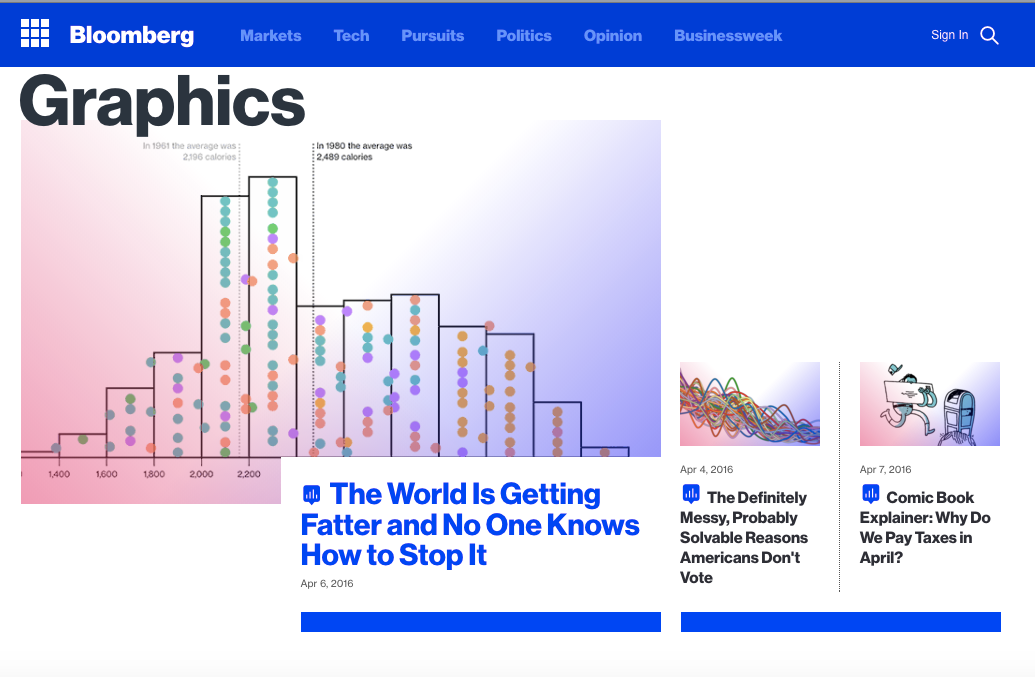Hi 5! The top five fintech stories we’re following today
How Bloomberg is fighting to reclaim homepage traffic
‘Apps are the new magazines’: Why Bloomberg’s doubling down on apps
How Bloomberg’s 20-person graphics team visualizes the news
The antidote to poor investing returns
One of the holy grails of financial research is to be able to identify those traits that make for better investors.
Why?
Because if we can isolate those skills top investors have, we can strengthen our own investment activity accordingly.
A recent study looked at the connection between IQ and stock market participation.
The real results aren’t what everyone is focused on…
Bloomberg’s BusinessWeek app launches to mixed reviews
Bloomberg Businessweek announced the launch of a beta version of its new Businessweek iPad app, available as an iTunes subscription for $2.99/month.
Pro
Dan Frommer is a pretty glowing in his admiration of the app, actually impressed with Bloomberg Businessweek’s new iPad app.
Bigger picture: While you could say that weekly business magazines are already irrelevant in the Twitter era, Bloomberg is at least spending money on making good products. (That’s the beauty of having a cash-printing terminal business with which to fund Bloomberg TV, magazines, etc.)
Con
TechCrunch’s Erick Schonfield is underwhelmed, calling the app nothing more than a digital reproduction of the magazine.
But with the iPad app, I am not getting all of that. It is nothing more than a digital reproduction of the print magazine. The news changes only once a week. In a world where news changes every minute, that lag time is one legacy you don’t want to bring over from print. And Businessweek doesn’t have to either. It’s website changes every day, and there is no reason those articles shouldn’t show up in the iPad app. Even the search function in the app only works for iPad issues in your archives. It doesn’t return results from the website.
By making its iPad app less informative than its website, Bloomberg Businessweek is signaling to readers that if they want to stay up to date they will be better off simply going to the website, which is free. So Bloomberg Businessweek thinks readers will want to pay $2.99 a month for less information that is presented in a prettier format. What readers end up paying for, essentially, is the tablet experience and bigger fonts.
Bloomberg’s app for Businessweek joins a host of other magazines trying to recreate themselves in the age of social media, apps, and mobile devices. From the Financial Times to Elle to Popular Science, publishers are signing on to Apple’s subscription service (or intend to).
Best way to trade the rumors? Bloomberg (and Tradestream) says short ’em
To a philosopher, all news as it is called, is gossip, and they who edit and read it are old women over their tea — Henry David Thoreau
Gossip is called gossip because it’s not always the truth — Justin Timberlake
With stocks, there is so much noise and pumping going on that investors can feel like they’re at a Motley Crue concert again. So, how do investors using smart strategies and historical data profit from rumors?
Bloomberg is out with proprietary data today that suggests shorting stocks caught up in merger rumors is a viable, profitable strategy.
Electronic news services, brokerages and newspapers reported at least 1,875 rumors about potential buyouts of 717 companies between 2005 and 2010, according to data compiled by Bloomberg. A total of 104, or 14.5 percent, were acquired, the data show. While stocks that were the subject of takeover speculation initially jumped 2.9 percent, betting on declines yielded average profits of 1.2 percent in the next month, an annualized gain of 14 percent.
In Tradestream, I devote an entire chapter, Grind the Rumor Mill, to rumor mongering and how that plays out for investments – essentially short-selling a basket of M&A rumors.  This strategy works because while real acquisition targets see above-average appreciation, most rumored M&As don’t actually come to fruition.
This strategy works because while real acquisition targets see above-average appreciation, most rumored M&As don’t actually come to fruition.
I included a rumor model developed by Nudge’s Cass Sunstein that he used in his recent book, On Rumors: How Falsehoods Spread, Why We Believe Them, What Can Be Done (affiliate link). This included identifying propagators, qualifying their prior beliefs, and predicting the cascading effect from any change/reinforcement of those priors.
Much of the guts and data behind this strategy was documented by Gao and Oler in “Rumors and Pre-Announcement Trading: Why Sell Target Stocks Before Acquisition Announcements?” (June 2008)
Data
The Strategy
- Research: Scan the WSJ’s Heard on the Street for reported, but unsubstantiated merger and acquisition rumors
- Adjust for market cap: The strategy works better when you remove companies with market cap >$20B
- Short basket trade: Short sell a basket of these rumored targets and hold for 70 days after the rumor first appeared. Cover. Hedge if you like.
- Timing best for hot M&A years: if M&A heats up (like now, right), the data show the strategy works even better
Last thing
The Bloomberg research found that this short-the-rumor strategy worked (+14%) even when it coincided with other contradictory bullish signals like call buying.
Call volume in New York-based Jefferies Group Inc. jumped amid unconfirmed takeover reports on Feb. 27, 2008. Calls on the company changed hands 12,692 times that day, 24 times the four- week average and the most in almost a year, and the shares gained 3.7 percent. A deal never occurred and Jefferies dropped 3.4 percent the next day, 10 percent the next week and 20 percent in 30 days. The S&P 500 lost 4.7 percent in a month.
Caveat emptor: I have not actually used this strategy in portfolios (I’m pretty much long only) and I think it would take balls of steel to really stick to it.
Further Reading on Investing and Rumors:
- On Rumors: How Falsehoods Spread, Why We Believe Them, What Can Be Done (affiliate link)
- Rumors and Pre-Announcement Trading: Why Sell Target Stocks Before Acquisition Announcements?” (Gao and Oler, June 2008)
- Mark Bagnoli, Messod Daniel Beneish, and Susan Watts, “Whisper Forecasts of Quarterly Earnings per Share,” Journal of Accounting and Economics 28 (1):27-50 (March 1999)
- Nilhabra Bhattacharya, Aamer Sheikh, and S. Ramu Thiagarajan, “Does the Market Listen to Whisper Numbers?” Journal of Investing, Vol. 15, No. 1 (Spring 2006): 16-24
- Susan Machuga, Karen Teitel, and Ray Pfeiffer Jr., “Explaining the Surprising Performance of Whisper Forecasts of Earnings” (July 2008)
- Werner Antweiler and Murray Frank, “Is all that talk just noise? The information content of internet stock message boards” (August 2001)
Insider Trading Dashboard: Everything you need to know
With the daily news of hedge funds being raided and expert networks being investigated, I wanted to put together a resource sheet for those looking to delve a bit further into the insider trading game.
Research
Decoding Insider Trading (Cohen): This new paper looks at a methodology to isolate insider traders acting on good information from noisy trades. By looking at individual trades — versus looking at all insider activity — investors can mimic better-performing trades, boosting performance of insider trading strategies.
Law and Economics of Insider Trading: A Comprehesive Primer (Bainbridge) 84 pages of insider trading awesomeness. This 2001 paper deals with everything from the origins of current laws prohibiting insider trading to defining an insider to making a case for and against regulating insider trading. For a smaller, more concise paper on insider trading, see Bainbridge’s Insider Trading: An Overview
Stock Market Anomalies: What can we learn from repurchases and insider trading (Core, Guay, Richardson, Verdi)
How Informative are Analyst Recommendations and Insider Trading (Hsieh, Ng, and Wang) Evidence points to insider trading and analyst recommendations giving conflicting signals. This paper documents that and provides theory why this may be the case.
What Insiders Know about Future Earnings and How They Use It: Evidence from Insider Trades (Ke, Huddart, Petroni) Insiders do trade on this stuff up to 2 years before public release.
Do Insider Trades Reflect Superior Knowledge About Future Cash Flow Realizations (Piotroski, Roulstone) Short answer: yes.
Insider Trade Disclosure, Market Efficiency, and Liquidity (Buffa): Policy implications after finding that informational efficiency and liquidity are lower in more transparent markets
Institutional Investors and Insider Trading Profitability (Markarian, Bricker) Insider profits are inversely related to presence of institutional ownership. Hedge funds/mutual funds may provide monitoring effect.
MSM (Mainstream Media) on Insider Trading
WSJ on Insider Trading (sub. req’d)
Bloomberg.com: Insider Trading
Google fastflip on Insider Trading
Tradestreaming on Insider Trading
Dealbreaker’s Insider Trading Fest(ivus)
Books on Insider Trading Strategies
Investment Intelligence from Insider Trading: If this book is the bible of insider trading strategies and research, its author, Professor Seyhun is Moses. Great research into strategies for following insiders.
Profit from Legal Insider Trading: Invest Today on Tomorrow’s News
The Vital Few vs. the Trivial Many : Invest with the Insiders, Not the Masses
Videos on Insider Trading
Stock-bond correlation falling, bullish for stocks?
Bloomberg out with a piece on the falling correlation between bonds and stocks.
Pioneer Investments, Security Global Investors and Citigroup Inc. say the broken connection is bullish as the greatest number of S&P 500 companies in a decade post earnings growth. During the bull market from 2002 to 2007 when the S&P 500’s price and profits doubled, the correlation averaged 0.15, data compiled by Bloomberg show.
The article believes that this change derives from a change in investor behavior — no longer are investors buying and selling based on macroeconomic factors but instead are returning to invest based upon profits and prospects.
Could be — the truth though — like everything in life — is probably somewhere in the middle. The story of a change in correlation here is probably more about the dislodging of the bond market than about a return to proper pricing of equities.
Source: Greed beats fear with stock-bond correlation falling (Bloomberg)















